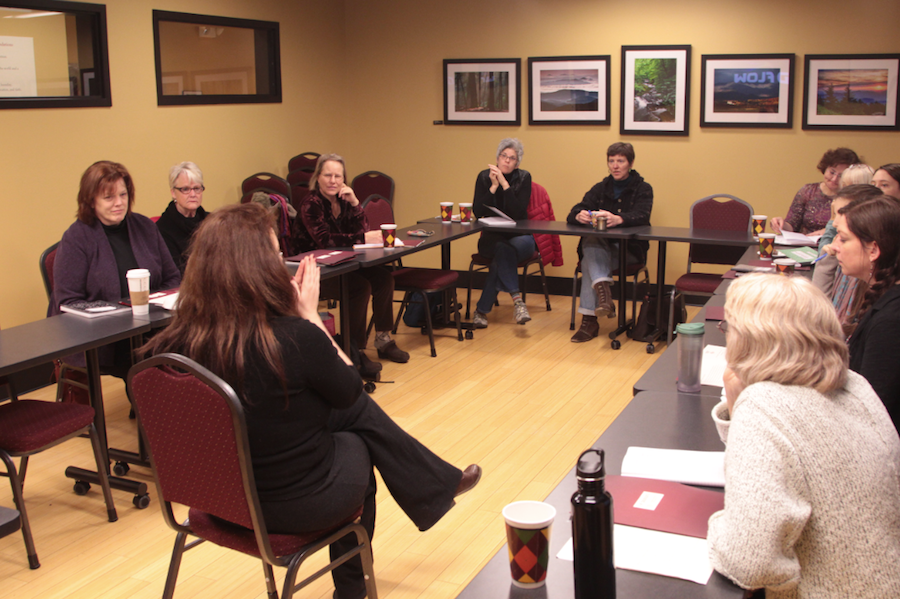Stories matter. And all stories need good listeners.
“At hospice, you bear witness to stories of people going through the dying process. It’s profound and emotional,” says Elaine Sharpe, a registered nurse who works in the palliative care unit at Four Seasons Hospice. “How do you hold that and not go numb?”
Professor Laura Hope-Gill and Dr. Claire Hicks seek to answer this question and questions like it through the use of narrative medicine. The women, who both took courses in narrative medicine at Columbia University where the method originated, are hosting a narrative medicine workshop series at Lenoir-Rhyne University. Last weekend, a small group of people gathered to learn more about narrative medicine and what it can offer to both patients and caregivers.
“Not all patients are storytellers, but every patient has a story to tell,” says Dr. Hicks, who believes that narrative medicine helps train us to listen, to empathize and to heal. During the workshop, Dr. Hicks shared insights from a physician’s perspective in her work with HIV patients in hospice and how writing enriches her capacity as caregiver. Hope-Gill shared her experience of writing from a patient’s perspective when she was diagnosed with late-onset deafness as a younger woman.
From Friday evening through Saturday afternoon, workshop participants gathered together to read, write and discuss the healing power of storytelling. Exercises included the close reading of texts and watching film clips, followed by group discussions. There were several short reflective writing sessions throughout the day. Each progressive exercise moved the group into deeper layers of sharing and insight. Attendees opened up and shared their own stories, exemplifying how narrative medicine works within the context of community, where true power is in the sharing of stories.
Traditional caregivers were not the only ones in attendance. Former army captain Dr. Celia Renteria Szelwach, founder and director of Woven Women Veterans Network, understands the value of narrative medicine in her work with veterans and their families. “Three years after I left the military,” she says, “I started writing poetry and I didn’t know why.” After working with fellow veterans, Szelwach realized that writing helped her make her own transition from the military to the corporate world. “In the military we’re told to stop whining, to suck it up and drive on. People may feel shame about speaking up and sharing. Narrative medicine gives everyone, including our veterans and family caregivers, a chance to share their experiences and personal truth without fear of judgment or reprisal.”
Reverend Dr. Shauna Hannan, a Lutheran pastor, sees the potential for narrative medicine in the church. “I’ve never had someone say specifically that people’s illness stories are sacred texts that deserve close readings,” says Hannan. “Of course, the church has forever engaged in close reading of the biblical text. We call it exegesis. But narrative medicine helps us pay close attention to people’s stories, in particular, illness stories.” In her job of teaching preachers, Hannan wants biblical stories to come alive and in ways that touch people’s lives. “Ministry is about slowing down and accompanying people,” she says. “Inviting people to tell their stories and listening carefully to them as sacred texts has the potential to open up the church. Stories matter.”
The importance of story is the driving force behind narrative medicine. “Ways to read story are ways to read life,” says Hope-Gill.
Along with co-facilitating the workshop series, Hope-Gill is currently teaching a one-month online course at Lenoir-Rhyne. This fall, she will teach a full 16-week course on narrative medicine at the university. Some of the special topics will include: literature of war and medicine, narrative of epidemic, patriot as hero/doctor as human, care and social justice, trauma and recovery in story and film, and diagnosis and narrative. For information about narrative medicine at Lenoir-Rhyne and future narrative medicine workshops, contact Laura Hope-Gill at laura.hopegill@lr.edu.




Before you comment
The comments section is here to provide a platform for civil dialogue on the issues we face together as a local community. Xpress is committed to offering this platform for all voices, but when the tone of the discussion gets nasty or strays off topic, we believe many people choose not to participate. Xpress editors are determined to moderate comments to ensure a constructive interchange is maintained. All comments judged not to be in keeping with the spirit of civil discourse will be removed and repeat violators will be banned. See here for our terms of service. Thank you for being part of this effort to promote respectful discussion.